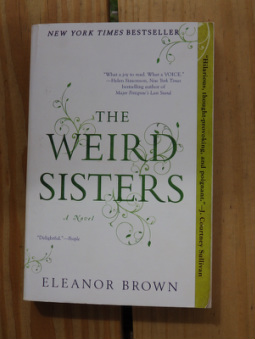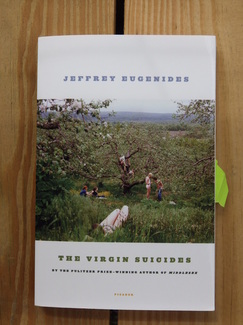 Seems like it was Mrs. Larney's Latin class that had us chanting, "Single: I-you-he/she/it, Plural: we-you-they" to memorize the various grammatical persons. So much of what Mrs. Larney taught really stuck with me -- and for so many years, too. When I started reading The Weird Sisters by Eleanor Brown, I was reminded of that chant. Many novels are told from the perspective of first person -- presenting the events from that person's singular and peculiar point of view. For example (and these first lines are identified at the end of this blog entry): "I have just come home from a visit to my landlord -- the only neighbor I shall be troubled with," or "Last night I dreamt I went to Manderley again," or "You don't know about me without you have read a book called The Adventures of Tom Sawyer, but that ain't no matter," or "The first place that I can well remember was a large pleasant meadow with a pond of clear water in it." The Weird Sisters (the title a reference to Shakespeare's King Lear) takes first person to an unusual level: the plural. Instead of "I," it's "we" talking to the reader.
The book is good -- I wouldn't be bubbling about it otherwise -- and not just because of the novelty of first-person plural. The writing is supple and interesting, rich with matter-of-fact observations and clever references, and vivid characters (the girls' father is a scholar of Shakespeare who nearly always speaks with a quotation from the Bard, for instance). The sisters' coming-home adventure is engaging, and author Eleanor Brown performs a kind of magic trick in presenting that peculiar collective identity often shared by sisters at home.
Rather than focusing on the suicides from the perspective of a single boy witness, author Eugenides expands the scope, magnifying the bewilderment and mystery. The events of that year take on the significance of myth, and the boys come to sound like a Greek chorus: "Sometimes, drained by this investigation, we long for some shred of evidence, some Rosetta stone that would explain the girls at last." It's funny and horrible and very affecting.
It's an old truth that bears repeating: the perspective from one tribe never quite reaches the far side of other people's lives. Maybe this is the work of all good novels, to give the tribe of readers a peep into someone else's experiences. * Wuthering Heights by Charlotte Bronte Rebecca by Daphne du Maurier Huckleberry Finn by Mark Twain Black Beauty by Anna Sewell
2 Comments
cathmason
9/23/2014 12:49:22 am
A delicious enticement to read, Amy.
Reply
Amy
9/23/2014 02:02:46 am
Thank you! That means my work here is done.
Reply
Leave a Reply. |
About the Blog
A lot of ground gets covered on this blog -- from sailboat racing to book suggestions to plain old piffle. FollowTrying to keep track? Follow me on Facebook or Twitter or if you use an aggregator, click the RSS option below.
Old school? Sign up for the newsletter and I'll shoot you a short e-mail when there's something new.
Archives
June 2024
Categories
All
|


 RSS Feed
RSS Feed
